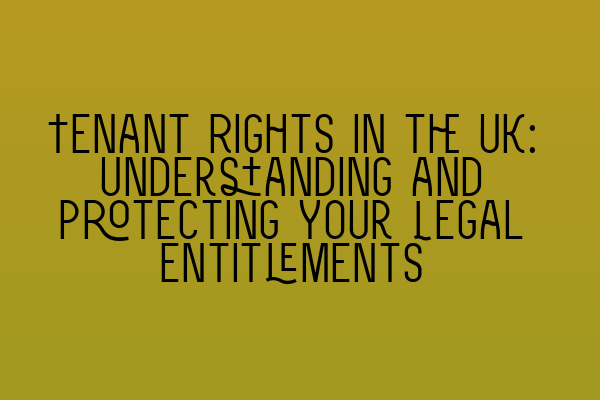Tenant Rights in the UK: Understanding and Protecting Your Legal Entitlements
As a tenant in the UK, understanding your rights is crucial to ensuring a secure and fair rental experience. The law provides certain protections for tenants, which can help you navigate the often complex world of property law. In this blog post, we will explore some of the key tenant rights in the UK and provide insight into how you can protect your legal entitlements.
1. Right to a Written Agreement
Under UK law, tenants have the right to a written tenancy agreement. This agreement should outline the terms and conditions of the tenancy, including rent amount, payment schedule, duration of the tenancy, and any additional terms agreed upon by both parties. It is important to thoroughly read and understand this agreement before signing to ensure you are aware of your rights and responsibilities as a tenant. If you have any concerns or questions, it is advisable to seek legal advice.
2. Right to Live in a Habitable Property
As a tenant, you have the right to live in a property that meets basic health and safety standards. Landlords are legally obligated to maintain the property and ensure it is safe and habitable. This includes providing essential amenities such as clean water, functioning heating and ventilation systems, and proper sanitation facilities. If you believe your rental property is in disrepair or poses a health and safety risk, you should notify your landlord in writing and give them a reasonable opportunity to address the issue. If they fail to do so, you may be entitled to take legal action or seek advice from your local council.
3. Right to Privacy
Tenants in the UK have the right to privacy and peaceful enjoyment of their rental property. Landlords are required to give reasonable notice before entering the property for inspections or repairs, unless there is an emergency. Your tenancy agreement should outline the notice period required. It is important for landlords to respect your privacy and not interfere with your quiet enjoyment of the property.
4. Right to Protection against Unfair Eviction
Under the UK law, tenants are protected against unfair eviction. Landlords must follow the proper legal procedures if they wish to regain possession of their property. This typically involves providing notice in writing and obtaining a court order if the tenant refuses to vacate. It is important to be aware of your rights and the eviction process in order to protect yourself from unlawful eviction. If you believe you are being unfairly evicted, you should seek legal advice immediately.
5. Right to a Deposit Protection Scheme
In the UK, landlords are required by law to protect your deposit in a government-approved tenancy deposit protection scheme. This scheme ensures that your deposit is held securely and can be returned to you at the end of the tenancy, minus any deductions for damages or unpaid rent. Your landlord must provide you with details of the scheme they are using within 30 days of receiving your deposit. If your deposit is not protected or you have concerns about its handling, you should seek advice from a solicitor.
Protecting Your Rights: What You Can Do
Being aware of your rights as a tenant is essential, but it is equally important to take proactive steps to protect yourself. Here are some actions you can take to safeguard your legal entitlements:
1. Read and Understand Your Tenancy Agreement: Thoroughly read and grasp the terms and conditions of your tenancy agreement before signing. If there is anything you are unsure about, seek legal advice.
2. Maintain Communication with Your Landlord: Regularly communicate with your landlord to address any concerns or issues that may arise during your tenancy. It is important to have a positive and open line of communication to resolve problems promptly.
3. Document Everything: Keep a record of all communication with your landlord, including emails, letters, and conversations. This documentation can be invaluable if any disputes arise in the future.
4. Report Repairs and Maintenance Issues: Promptly report any repairs or maintenance issues to your landlord in writing. If they fail to address the problems, contact your local council for guidance and support.
5. Join a Tenants’ Rights Organization: Consider joining a tenants’ rights organization to stay informed about changes in legislation and to access support and advice from experts in the field.
Understanding your tenant rights and taking steps to protect them is crucial for a positive renting experience. Remember to seek legal advice if you have any concerns or questions about your rights or any issues that arise during your tenancy.
For additional resources on property law, preparation courses for the SQE exams, and practice exam questions, please visit the related articles below:
– SQE 1 Practice Exam Questions
– SQE 1 Practice Mocks FLK1 FLK2
– SQE 2 Preparation Courses
– SQE 1 Preparation Courses
– SRA SQE Exam Dates
At SQE Property Law & Land Law, our team of experts is dedicated to assisting tenants with their legal needs. Contact us today for professional advice and support in understanding and protecting your tenant rights.
